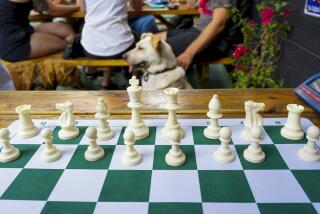Kasparov Concedes Chess Title to Protege
- Share via
LONDON — Garry Kasparov, the brilliant and volatile reigning champion of chess for the last 15 years, lost his title Thursday night to a former pupil and fellow Russian who was a schoolboy when the master rose to power.
Kasparov’s stunning defeat at West London’s Riverside Studios left admirers slack-jawed and stuttering to explain how the king--still just 37 years old--could let his crown fall to upstart Vladimir Kramnik.
A vicious competitor known for terrorizing his rivals, Kasparov conceded with uncharacteristic grace in the 15th game of a 16-game tournament.
“This match was won by Vladimir’s excellent preparation,” an exhausted Kasparov offered. He added that his protege “definitely played better than me.”
Kramnik, a shy and lanky 25-year-old, was as modest as Kasparov normally is brash. He barely smiled.
“During the match, often I had the feeling that I had no brains,” Kramnik said.
Kasparov, who has dominated world chess since he similarly trounced Anatoly Karpov in 1985, said he would seek a rematch as soon as the new champion is ready.
Titles are not universally recognized in the politically divided chess world. But despite his acrimonious split with FIDE, the official World Chess Federation, Kasparov has been acknowledged as the best player. This match was widely regarded as a showdown to be No. 1.
Kasparov made it to the top with a mix of sparkling strategy and brutal psychological warfare. He was the dashing, swaggering Muhammad Ali of chess, treating his adversaries with contempt to the point of scoffing aloud at their moves. And he was a genius at board play.
Before the tournament--his sixth defending his world title--Kasparov boasted that he would beat the best of a new generation of players.
But very quickly, Kasparov appeared to be off-balance and lacking his usual charm-cum-arrogance. He offered a draw after just 11 moves into the seventh game, the shortest of his career. After that, he frequently twitched, massaged his brow and stared at the ceiling as the clock ticked. He failed to win a single game.
Kramnik was leading eight points to six as the two players faced off Thursday, having won two games with 13 draws. Kasparov needed to beat Kramnik in the final two games if he was to hang on to his title.
Chess enthusiasts knew that would take a miracle given the way Kasparov had been playing. But the champ had managed miracles before, having once come from five games behind to beat Karpov.
Kasparov’s introduction on stage as the world champion was met with a sustained ovation from an audience wondering if this would be the last time he would be addressed this way.
Kramnik received polite applause.
Kasparov sat down, took off his watch, adjusted his tie. He seemed uncomfortable in his skin. But playing the white pieces--giving him the chess equivalent of a first serve in tennis--Kasparov started out strong. The commentators grew animated, along with spectators listening to the play-by-play through earphones and following on the Internet.
He lost ground, gained it back with a few surprise moves, and lost it again to the young man who had consistently outwitted him during the tournament. After 38 moves, the players agreed on a draw, eliminating the possibility of a Kasparov victory. With just one game remaining today, which the two men are obligated to play, Kasparov cannot catch up.
“It is an earthquake,” said American grandmaster Larry Evans, a friend and former associate of onetime champion Bobby Fischer. “It is hard to think of the chess world without Kasparov as No. 1. Many people will still think of him as the strongest player in the world.”
Observing his slide into defeat during the last couple of weeks, chess commentators speculated as to the causes. Kasparov hinted at personal problems during the tournament, although he offered no excuses or explanations Thursday night.
Some chess commentators suggested that he may be a mental athlete past his prime--over the hill at 37 in a grueling mind game. But others dismissed this idea, noting that he had played stunningly and won three other tournaments this year. A chess champion’s decline usually is gradual, not a sudden plummet.
Other observers hinted that Kasparov never fully recovered from the psychological blow of his defeat by the IBM computer Deep Blue in 1997. Until then, Kasparov felt invincible, they said.
But match organizer Raymond Keene, a British grandmaster and longtime friend of Kasparov, dismissed these explanations.
“I suspect it’s purely chess. Kramnik was a lot stronger than [Kasparov] thought he would be, and Kasparov failed to adjust,” Keene said. “It seemed to knock the stuffing out of him.”
But Keene acknowledged that Kasparov may have found it difficult to vilify his former student in the way he is accustomed to do with other adversaries.
“One thing Kasparov likes to do is hate his opponent,” Keene said. “If he can’t find reason to hate the guy he’s playing, it’s a bit of a problem.”
Kramnik offers little to hate. Where Kasparov is compared to a volcano, Kramnik is called an iceberg. Kasparov is dynamite; Kramnik an architect.
“Kasparov is sort of a revolutionary. Kramnik is a cathedral-builder,” Keene said. The new champion is “very well prepared--very, very solid.”
A King Falls
Longtime chess champion Garry Kasparov lost to fellow Russian Vladimir Kramnik in Thursday’s championship match in London. The moves:
Kasparov - Kramnik
Source: Associated Press
More to Read
Go beyond the scoreboard
Get the latest on L.A.'s teams in the daily Sports Report newsletter.
You may occasionally receive promotional content from the Los Angeles Times.










